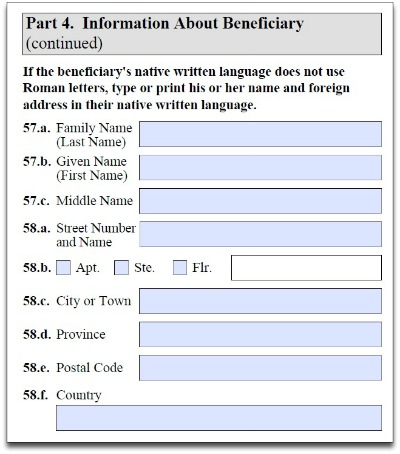In Part 4 (Items 57-58) of Form I-130, Petition for Alien Relative, the instructions ask the petitioner to type or print the beneficiary’s name and foreign address in their native written language if that beneficiary’s native written language does not use Roman letters.

For example, a beneficiary from China or Saudi Arabia might use non-Roman characters when writing. In these cases, the petitioner should write out the name and address of the beneficiary.
Mistakes on your Form I-130 can cause costly delays or a denial.
With CitizenPath, you can confidently prepare your I-130 petition the right way — quickly and affordably. Our attorney-reviewed software simplifies complex forms and provides a personalized checklist of supporting documents for your situation. Start your journey with peace of mind — no credit card or account required to try.Try CitizenPath today and file with confidence >>
But what if the petitioner is unfamiliar with the written language and is unable to write these characters? For example, a U.S.-born citizen that petitions his Chinese national spouse may not be able to write Chinese characters. Assuming the petitioner is in the United States and the beneficiary is outside the U.S., this can present a challenge. In these cases, the petitioner may write “Unable to write Chinese characters and will submit at the time of interview.”
Alternatively, the petitioner may forward the document (by mail or email) to the beneficiary so that the beneficiary can complete Items 57-58 in his or her native written language.

